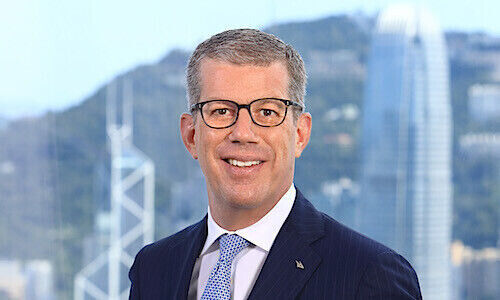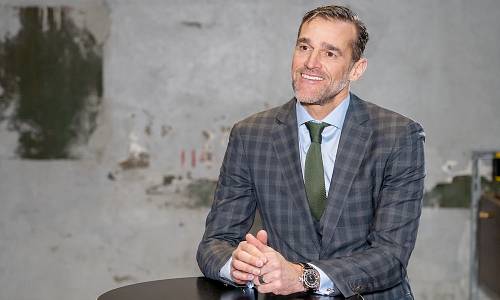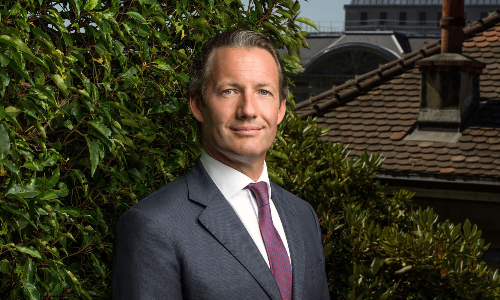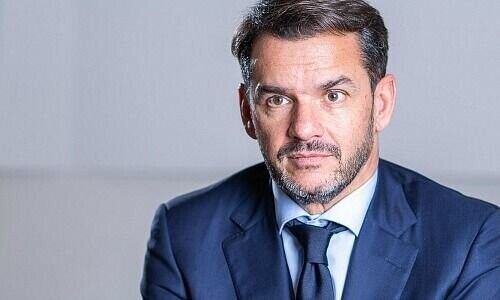There will be huge opportunities in Swiss banking in the coming months. However, the potential pitfalls increased too. For these people, 2024 will thus be a year on razor's edge.
1. Benjamin Cavalli: From Crisis Bank to Iqbal Khan’s Number Two

(Image: CS)
The demise of Credit Suisse brought many careers at the bank to a premature end. But not that of Benjamin Cavalli, the former head of Asia at the bank: Iqbal Khan, the head of UBS’s core business with Global Wealth Management, appointed the Zurich native as his right-hand man last summer. Cavalli also heads up an elite team of private bankers, which serves UBS’s «strategic» private clients worldwide.
These clients make up an important part of UBS’s wealth management business. This means that a lot depends on Cavalli’s success – and his boss Khan would have to change horses all the more quickly in the event of failure. Some high-ranking Credit Suisse bankers, whom Cavalli has surrounded himself with, have also already raised eyebrows: Thus Babak Dastmaltschi, once a big wheel in the Eastern European market.
2. Simone Westerfeld: Showing Class in the Mass Business

(Image: BKB)
In this woman Sabine Keller-Busse puts her trust: Last September the head of Switzerland in the merged UBS confirmed Simone Westerfeld as Head of the combined Personal Banking. This is the mass business with local retail customers. There is a need to make up ground here, as the two big banks have lost market share in recent years, particularly to the cantonal banks.
With the new UBS-Credit Suisse, however, the public banks are now facing a different kind of competition. Moreover, UBS has invested heavily in the digitalization of this business and could leverage the new economies of scale accordingly.
Westerfeld seems to be the woman for the job. She is considered a digitalizer, knows the Swiss market inside out – thanks to her career at Credit Suisse and Basler Kantonalbank – and also has a theoretical background as a professor of finance. The manager also seems to have committed herself to UBS: According to rumors, she passed up a position as the new head of Postfinance for the job at the big bank.
3. Evie Kostakis – Trusted Julius Baer Banker

(Image: Julius Baer)
The debacle surrounding alleged loans to the insolvent Signa Group has severely shaken confidence in the private bank Julius Baer. Observers and investors alike are asking themselves how it was possible that the traditional Zurich company, considered conservative, granted loans of more than 600 million francs. That is why CEO Philipp Rickenbacher and Chairman Romeo Lacher, who are ultimately responsible for steering the banking group, do not exactly look their best.
In contrast, Evie Kostakis has managed to mend the cracks in Julius Baer’s image. The CFO personally approached industry analysts and was able to inspire those from Zuercher Kantonalbank, for example, to produce a rather optimistic report.
As the mistress of Baer’s ledgers, she will also have a decisive role to play in the coming months. She must help to ensure that potential write-downs on the dicey loan do not threaten the institution’s financial stability.
4. Iwan Deplazes: Asset Management Veteran With a New Outlook

(Image: ZKB)
Iwan Deplazes is certainly not a novice in the Swiss financial sector. After all, he has headed the fund business of Zuercher Kantonalbank (ZKB) since 2007 and is regularly in the spotlight as president of the Asset Management Association Switzerland (AMAS).
Nevertheless, the veteran could unexpectedly become a «shooting star» at the public bank: With its Swisscanto fund brand, ZKB is regarded as the preferred destination for assets moving out of the asset management of the two big banks as a result of the UBS-Credit Suisse merger. According to observers, large pension fund assets will also increasingly start to shift in the first half of 2024.
With the increasing weight of his portfolio, Deplazes could even be granted a seat on the Executive Board of ZKB (General Management). Up to now, Asset Management has only been represented at the public bank as a directorate.
5. Marc Pictet: New Guardian of the Keys to Pictet's «Fortress»

(Image: Pictet)
There will be a significant change of guard at Pictet in 2024. The current senior partner Renaud de Planta will step down from his position at the end of June 2024. In his place, as a representative of the younger generation, Marc Pictet takes over at the venerable Geneva private bank. He joined Pictet in 2001 and has been a managing partner of the Group since 2011, where his responsibilities include co-heading the wealth management business.
Under the aegis of de Planta, the image of Pictet as a «fortress» became firmly established: The bank is regarded on the market as a bulwark that is above all committed to protecting the assets entrusted to it. However, the demise of Credit Suisse and the new megabank UBS offer growth opportunities that only come along once in a generation in private banking.
The question now is whether, under Marc Pictet, the Partnership Committee will abandon its noble restraint and go on the offensive to woo the big bank’s clients and employees.
6. Serge Fehr – Fly High or Fall Low at Lombard Odier

(Image: CS)
Its Geneva-based competitor Lombard Odier has been much more active in this respect in recent months: The private bank has made a name for itself as the preferred destination of choice for Credit Suisse executives looking for a change.
The Geneva-based company’s biggest coup was probably the recruitment of Serge Fehr, the former head of Credit Suisse Private Banking in Switzerland. Fehr is once again responsible for the Swiss market at Lombard Odier and has brought other people from Credit Suisse to the company, such as Sabine Heller as the new head of the Zurich office.
Of course, the «Fehr-Factor» raises huge expectations that still need to be realized. Lombard Odier was quick to seize the opportunity of the Credit Suisse downfall and invested heavily in recruitment. However, the partner-managed bank will likely pull the plug just as fast if the new hires from the big banks disappoint.
7. Great Pressure on Vontobel's Christel Rendu de Lint

(Image: Vontobel)
The announcement of the new joint leadership at Vontobel with Georg Schubiger and Christel Rendu de Lint has so far been met with only lukewarm enthusiasm: The era of the long-successful CEO Zeno Staub will now be replaced by a joint leadership at the investment house. Things will get serious for them come January, with the greater pressure likely to fall on Rendu de Lint.
The investment expert, who has enjoyed a steep rise at the venerable Zurich institution, is responsible for the Group’s most important pillar, investment management. At the same time, this is the area where there is the greatest need for further action. In recent months, clients have withdrawn billions of euros in assets there, and Vontobel’s actively managed equity and bond funds are currently failing to respond to investor demands.
For Rendu de Lint, the chief executive position will therefore be a job that hangs in the balance: Results must be achieved quickly and the manager, who has appeared somewhat lackluster to date, must also gain a profile as a leader. All of this is closely watched over by Vontobel Chairman Andreas Utermann, also an asset manager by trade – and therefore probably a strict referee.




































